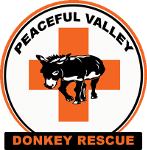The Reality of Donkeys Housed With Other Livestock
July 2024 - Article 2
While Disney movies often paint the perfect, picturesque image of farm animals all living together in perfect harmony, the reality is very different. Ask any experienced farmer and they will tell you all the reasons they house different species separately.
We are often asked why we don’t recommend housing donkeys with other livestock. The quick answer is that many of the donkeys that come into our rescue were once used as livestock guardians and they failed at their job, meaning the livestock they were supposed to guard were harassed, hurt or even killed by the donkeys. The last thing we want is for your beloved goats, pigs, sheep, and even cows to be hurt or worse by a donkey that may have a history of this, or by a donkey that develops any of these behaviors with your livestock.
The long answer about why most donkeys fail as livestock guardians is below along with many of the factors that contribute to the challenges and aggression. If you are thinking that you don’t want the donkeys as livestock guardians, you just want to house them together, it’s still not recommended for all the same reasons. Donkeys don’t differentiate between being a livestock guardian or just a member of the family farm. If they are housed with other livestock, all these issues can come into play.
Aggression towards other animals
While donkeys can be protective of their territory and the animals they consider part of their herd, they can also be aggressive towards them. This aggression can pop up out of nowhere potentially leading to injuries or death for other livestock and even companion animals.
Donkeys will often target calves and harass them and keep them away from the cows. This can lead to the calves inability to nurse. In many cases, the donkeys escalate to aggressive behavior and end up hurting or even killing calves. Donkeys will do the same with goats or sheep but it’s not limited to the kids or lambs. We get rescue calls all the time asking us to pick up donkeys that “did more damage to the livestock in one season than all the predators combined over all the years”.
Aggression toward other animals is also not something we can test for. A donkey might love having your goat jump on its back one day, and the next day the donkey is thrashing the goat around the way a puppy might play with a squeaky toy.
Socialization requirements
Donkeys are social animals that form strong bonds with other donkeys. Their need to bond with another donkey is a survival instinct. This instinct can be so strong that a donkey who loses its bonded pair can die from the related stress. This is because donkey’s can only get their deep sleep - the equivalent of a human's REM sleep - with another equine standing guard. This is a basic survival strategy that is hard wired into every donkey. If a single donkey is kept with other livestock they may become stressed, sleep deprived and exhibit undesirable, erratic behaviors. Cows, sheep, goats or farm birds can not replace the special dependance donkeys have on other equines, but they are often the target of their erratic behavior.
Dietary considerations
Donkeys have different dietary needs compared to other livestock animals. They require a specific diet that includes high-fiber and low-protein feeds - not an abundance of pasture grass. Donkeys housed with cattle, sheep or goats usually end up living on too much grass and eating feeds designed for other species. This can cause nutritional deficiencies, causing the donkeys to become unhealthy, unable to walk due to laminitis, and they can ultimately die as a result. Donkeys also need a low iron mineral salt which differs species to species. Animals housed together are likely to get the wrong levels of minerals which can also lead to many health issues.
Housing
Donkeys require shelter from rain and cold winds. When housed with other animals, they often get pushed out of shelters by the other animals. A wet, cold donkey is a sick donkey and a sick donkey can be very challenging to help them recover. Despite being labeled as hardy animals, they are actually quite sensitive, but they are very stoic which makes it hard to tell when something is wrong. By the time a donkey is showing symptoms of being ill, it’s often too late to help them.
Summary
Again, we don’t want to see our donkeys returned because they hurt your livestock, and we don’t want to see your livestock hurt by one of our donkeys. We also don’t want to see our donkeys put in a position where they aren’t given the optimal housing, dietary and social needs. Housing donkeys and livestock together may work okay for some situations and some donkeys and livestock, but for those that it doesn’t work for, it’s just not worth the risk.
